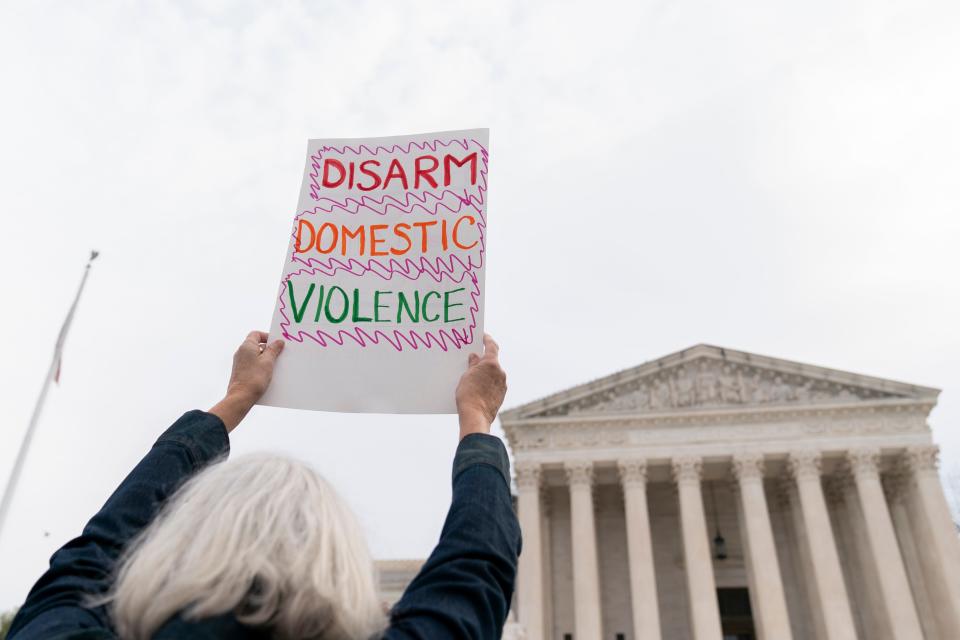Arizona groups weigh in on domestic violence gun restriction before US Supreme Court
- Oops!Something went wrong.Please try again later.
A case heard at the U.S. Supreme Court last week could impact gun rights in Arizona and across the country.
At issue in U.S. v. Rahimi is whether a federal law that prohibits firearm possession by people who are subject to domestic violence restraining orders violates the Second Amendment. A lower court struck down the law, and the government sought a high court review.
Last year, the Supreme Court struck down a New York gun law that required people to have "proper cause" to carry a handgun. Writing for the majority in that case, Justice Clarence Thomas signaled that similar laws that depart from the country's "historical tradition of firearm regulation" could also be overturned.
The National Rife Association, in its brief supporting the lower court decision in U.S. v. Rahimi, said the federal law barring gun possession by people subject to domestic violence restraining orders does not align with the nation's tradition of gun regulation.
"Traditionally, people needed to be convicted before they could lose their Second Amendment rights," the NRA wrote.
Several Supreme Court briefs from criminal defense lawyer groups also argued the law should be struck down because orders of protection are often issued without adequate review of the underlying allegations. Essentially, they argued, restraining orders lack the level of due process that should be required before someone's access to a gun should be withheld.
"These orders of protection are issued without any meaningful opportunity to contest the underlying allegations," the National Association of Criminal Defense Lawyers said in its brief with the Bronx Defenders Union. "The process for issuing an order of protection is superficial and swift, and the consequences to the target are immediate and brutal."

But during oral arguments, the justices signaled the court would likely uphold the law Zackey Rahimi, a Texas man, was convicted of violating.
Several organizations with Arizona ties weighed in on the domestic violence gun restriction in briefs submitted to the Supreme Court. A ruling from the Supreme Court is expected by early summer.
Former chief justices of state high courts
Former Arizona Supreme Court Chief Justice Ruth McGregor joined six other former state chief justices in filing a friend of the court brief in support of the federal government's effort to uphold the gun restriction.
McGregor and the other former chief justices told the U.S. Supreme Court that as leaders of state high courts, they "gained an understanding of the important role played by state judiciaries in temporarily disarming perpetrators of domestic violence."
The former chief justices also said they “witnessed firsthand the important role that state judiciaries play in grappling with and applying major precedents" of the U.S. Supreme Court "to local laws and procedures.”
They argued that domestic violence restraining orders that temporarily block access to firearms “play a vital part in the administration of justice and public safety.”
“These orders allow state courts to safeguard both families and the integrity of judicial proceedings” by providing “tailored relief,” McGregor and the other former chief justices wrote.
Gun violence in the US: 'It shouldn’t be this way': Gabrielle Giffords reacts online to shooting massacre in Maine
Gun violence center named for Gabby Giffords
The Giffords Law Center to Prevent Gun Violence, named for former U.S. Rep. Gabby Giffords, also filed a brief in support of the federal government’s position.
“By disarming domestic abusers,” the group wrote, the federal law being challenged by Rahimi "helps prevent the use of guns to commit domestic abuse and hampers abusers’ efforts to control their intimate partners.
“This helps democratic society as a whole by shielding victims of domestic abuse who are entitled to a full array of rights — including the freedoms of association, speech, and religious exercise, and the right to vote — that domestic abusers armed with firearms can eliminate or chill.”
Prosecutor group interested in reducing gun violence
Pima County Attorney Laura Conover is a member of the non-partisan group Prosecutors Against Gun Violence, which filed a brief in support of the federal government. Conover said the ability to take away firearms is a valuable tool in a domestic violence situation that her office uses to provide an additional layer of safety to people who have experienced domestic violence and the community at large.
Such laws have “tremendous due process and notice” built into them, Conover said.
“When someone seeks an order of protection, the person who is served with that has every opportunity to go to court and argue against it and have it removed,” Conover said. “And so the concerns about abuse of power, infringing upon Second Amendment rights — those arguments really become null.”
Arizona politics: Peoria mayor takes trip to war-torn Israel for 'accurate accounting of the horror'
Arizona and more than 20 other states
Before the Supreme Court agreed to hear U.S. v. Rahimi, Arizona was among two dozen states that filed a brief urging the justices to take the case and uphold the federal domestic violence-related gun restriction. Attorney General Kris Mayes represented Arizona on the brief.
The lower federal court's decision striking down the federal law "threatens to undermine not only the federal government's efforts to keep firearms out of the hand of dangerous individuals" but the states' regulations as well, attorneys for the states wrote.
Arizona law permits restricting the purchase of firearms by people who are subject to a domestic violence restraining order.
USA TODAY reporter John Fritze contributed to this article.
Have a news tip on local, state or federal courts? Reach the reporter at jjenkins@arizonarepublic.com or at 812-243-5582. Follow him on X, formerly known as Twitter @JimmyJenkins. Support local journalism. Subscribe to azcentral.com today.
This article originally appeared on Arizona Republic: Arizona advocacy, prosecutor groups weigh in on Supreme Court gun case

